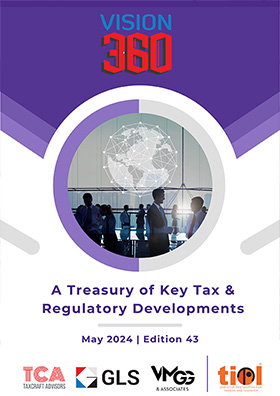SEPTEMBER 17, 2018
By V Ravindran & R Alwan, Advocates
 SUPPLY of electricity to the consumer bristled with a lot of issues under the service tax regime. In fact, the recent Bombay High Court decision in Eon Hinjewadi Infrastructure Pvt. Ltd. - 2018-TIOL-1892-HC-MUM-ST is an indicator that that litigation would surely turn electrifying in the days to come. SUPPLY of electricity to the consumer bristled with a lot of issues under the service tax regime. In fact, the recent Bombay High Court decision in Eon Hinjewadi Infrastructure Pvt. Ltd. - 2018-TIOL-1892-HC-MUM-ST is an indicator that that litigation would surely turn electrifying in the days to come.
Even under GST, it continues to be so.
Based on the approval and direction of the Fitment Committee of the GST Council in the meeting held from 9 to 13.1.18, Circular No. 34/8/2018-GST dated 1.3.18, in Sl. No.4 in the Table there, states that "Service by way of transmission or distribution of electricity by an electricity transmission or distribution utility is exempt from GST under notification No. 12/2017- CT (R), Sl. No. 25. The other services such as, -
i. Application fee for releasing connection of electricity;
ii. Rental Charges against metering equipment;
iii. Testing fee for meters/ transformers, capacitors etc.;
iv. Labour charges from customers for shifting of meters or shifting of service lines;
v. charges for duplicate bill; provided by DISCOMS to consumer are taxable ".
On the other hand, circular issued by the Central Board of Excise & Customs regarding service tax- No. 131/13/2010-ST dated 7.12.10 - stated that "It is a general practice among electricity transmission (TRANSCO) / distribution companies (DISCOM) to install electricity meters at the premises of the consumers, to measure the amount of electricity consumed by them and ‘hire charges' are collected periodically. Supply of electricity meters for hire to the consumers being an essential activity having direct and close nexus with transmission and distribution of electricity, the same is covered by the exemption for transmission and distribution of electricity, extended under the relevant notifications".
Again, the GST Council in its 28th meeting held on 21.7.18 clarified that "certain services such as "deposit works (expenses for providing electric line/plant)" related to distribution of electricity provided by DISCOM, attract GST ".
Clarifications dated 21.7.18, and 1.3.18 are at loggerheads with statutory provisions but the earlier circular dated 7.12.10 (which stated the opposite of latter one dated 1.3.18) is in consonance.
Charging section 9(1) in the CGST Act states "... there shall be levied a tax called the central goods and services tax on all intra-State supplies of goods or services or both ... on the value determined under section 15 ... ". Section 15(2) states:
The value of supply shall include-
(a) any taxes, duties, cesses, fees and charges levied under any law for the time being in force other than this Act, the State Goods and Services Tax Act, the Union Territory Goods and Services Tax Act and the Goods and Services Tax (Compensation to States) Act, if charged separately by the supplier;
(b) ... ... ... ;
(c) incidental expenses, including commission and packing, charged by the supplier to the recipient of a supply and any amount charged for anything done by the supplier in respect of the supply of goods or services or both at the time of, or before delivery of goods or supply of services;
(d) interest or late fee or penalty for delayed payment of any consideration for any supply; and
(e) subsidies directly linked to the price excluding subsidies provided by the Central Government and State Governments.
On the basis of the above provisions - section 9 read with section 15, an exemption from the levy of GST means that the value of the supply is exempt from GST. Questions, therefore, have to asked and answered are -
Whether the fees, charges, and expenses mentioned in the circulars dated 21.7.18, and 1.3.18 are fees and charges levied under any law for the time being in force, or charges for anything done by the supplier in respect of the supply of goods or services or both at the time of, or before delivery of goods or supply of services or incidental expenses .
Section 50 of the Electricity Act, 2003 states that "The State Commission shall specify an electricity supply code to provide for recovery of electricity charges, intervals for billing of electricity charges, disconnection of supply of electricity for non-payment thereof, restoration of supply of electricity; measures for preventing tampering, distress or damage to electrical plant, or electrical line or meter, entry of distribution licensee or any person acting on his behalf for disconnecting supply and removing the meter; entry for replacing, altering or maintaining electric lines or electrical plants or meter and such other matters ". Accordingly, the State Electricity Commissions have prescribed on the above matters in the respective supply codes including for the fee / charges.
For example, the Tamil Nadu Electricity Regulatory Commission's Codes and Regulations have been issued under section 50 of the said Electricity Act, 2003, read with section 181 thereof and all other powers enabling in that behalf . The codes and regulations, among other things, prescribe the charges, recoverable by the Licensee from the consumers. Such charges include Service connection charges, Application Registration charge, Service/line/structure/equipments shifting charges, Consumer meter card replacement charge, Charges for testing of equipments/installations, etc. Therefore, the above are fees and charges levied under the law relating to supply of electricity. These charges and fees constitute, under section 15(2)(a) the value of the exempt supply of electricity.
The above legal position should suffice to include the above said fees and charges in the value, u/s 15(2), of the value of supply of electricity which is exempt.
The very fact that the electricity supply code considered the charges and fees incidental to the supply of electricity is proof that the charges and fees are charged for things done by the supplier in respect of the supply of electricity.
In Gujarat, for another example, the Gujarat Electricity Regulatory Commission, in exercise of the powers conferred by section 181 read with section 45 and 46 of the Electricity Act, 2003 and all powers enabling it in that behalf, has framed Gujarat Electricity Regulatory Commission (Licensee's Power to Recover Expenditure incurred in providing supply and other Miscellaneous Charges) Regulations, 2005. The regulations prescribe the charges for various matters including those dealt with in the circulars cited above.
Even if we examine, independent of the Electricity Act, the fees, charges, and expenses in issue in the circulars, we get the following answers:
1. Application fee for releasing connection of electricity is incidental expense charged by the supplier to the recipient of electricity supply. Electricity is not something handed over across the counter to a walk-in customer. The consumers and premises particulars are essential.
2. Rental Charges against metering equipment is incidental essential expense to measure the quantum and value of the supply.
3. Testing fee for meters/ transformers, capacitors etc., are incidental and essential to supply of electricity.
4. Labour charges collected from customers for shifting of meters or shifting of service lines are incidental to supply of electricity and are amounts charged by the supplier in respect of the supply of goods or services or both at the time of, or before supply.
5. Charges for duplicate bill are incidental to the supply.
6. Deposit works (expenses for providing electric line/plant) are incidental expenses and are amounts charged for anything done by the supplier in respect of the supply of goods or services or both at the time of, or before supply.
The charges and fees that the Circulars seek to tax are the ones that are part of the value of the supply not leviable to GST. The Circulars are apparently ultra vires the Act. Such Circulars coupled with the Advance Rulings decisions delivered these days would sooner than later become the single largest source of litigation. It would, therefore, be better if the committees of the GST Council / the GST Council float draft circulars in the public domain and seek reactions of the stakeholders and consider them in the right earnest before clarifications are issued. Alternatively, the committees of the GST Council / the GST Council should get the benefit of dedicated expert group's opinion (Group comprising of non-revenue technocrats) on techno-legal aspects before issuing the circulars.
This alone would avert litigation explosion, as also reduce the transactions costs of the government and the governed alike, promote ease of doing business and achieve the objectives of the GST.
(The views expressed are strictly personal.)
| (DISCLAIMER : The views expressed are strictly of the author and Taxindiaonline.com doesn't necessarily subscribe to the same. Taxindiaonline.com Pvt. Ltd. is not responsible or liable for any loss or damage caused to anyone due to any interpretation, error, omission in the articles being hosted on the site) |
|









 Download PDF
Download PDF SUPPLY of electricity to the consumer bristled with a lot of issues under the service tax regime. In fact, the recent Bombay High Court decision in Eon Hinjewadi Infrastructure Pvt. Ltd. -
SUPPLY of electricity to the consumer bristled with a lot of issues under the service tax regime. In fact, the recent Bombay High Court decision in Eon Hinjewadi Infrastructure Pvt. Ltd. - 



